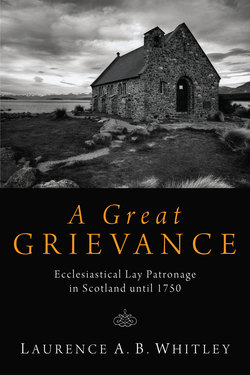Читать книгу A Great Grievance - Laurence A.B. Whitley - Страница 6
На сайте Литреса книга снята с продажи.
Preface
ОглавлениеScottish Presbyterianism as a form of church government evolved out of the Reformation of 1560, and was based on a hierarchy of courts. At parish level, the elders met in what was called the kirk session, and their meetings were chaired by the minister, who was termed the court’s moderator. Each session in a particular area sent representatives to the superior court, which was known as the presbytery. Superior to the presbytery was the provincial synod, which was in turn answerable to the General Assembly, which met once a year and was the final court of appeal. More on how the system worked in practice will be seen from the book which follows.
In the meantime, the glossary provided below will explain the political and ecclesiastical terms and labels that will occur most.
Advowson—the right of presenting to a benefice, especially in England
Argathelians—members and supporters of the house of Argyll
benefice—an office involving certain duties, for whose discharge revenues are provided
collation—institution to a benefice; the term can be used exclusively to describe institution to a living where the bishop is himself the patron. It is here applied, however, to episcopal institution in general
edict—a legally authoritative public intimation (eg., of a vacancy)
Erastianism—deriving from the Swiss theologian Thomas Erastus (1524–83), the doctrine that the State has the right to legislate in ecclesiastical matters on behalf of its national Church.
extract—a part taken from the minutes of a court by the authorised official
General Assembly Commission—a body specially commissioned at the end of each Assembly to meet (usually four times) and act in its name until the following Assembly. Originally elected without reference to the membership of Assembly, from 1705, presbyteries were to be proportionally represented on it; from 1719, only Assembly commissioners were to be included as members; from 1736, the proportion between ministers and elders was to be the same as for the Assembly. The Commission was properly only empowered to conduct such business as the Assembly had given it authority to handle, but where such a line could be drawn was a subject of intense controversy.
heads of families—the representatives of the ordinary parishioners
heritors—the owners of heritable property in a parish
High Presbyterian—pertaining to the stricter traditions of Covenanting Presbyterianism
horning, letters of—a warrant used to cite a defender to appear or pay a debt
jus devolutum—a right devolved on a party because of its not having been exercised within the appointed time by those having priority
libel—the formal indictment by which a minister or probationer is charged with misconduct or heresy
Lord High Commissioner—the Crown’s official representative at meetings of Assembly
Marrowmen—evangelicals, like Thomas Boston, who approved of the English Puritan book, The Marrow of Modern Divinity, published by Edward Fisher of Oxford in 1646.
moderate men—pro-establishment, pro-learning and pro-moderation churchmen who eschewed what they regarded as the vulgar and disruptive tendencies of the evangelicals
moderating a call—the Presbytery’s representative convenes a meeting of the parish’s electors and attempts to guide them into centring harmoniously upon a candidate. If he is successful, a call is signed by the electors. He then attests it and submits it to Presbytery for concurrence
patrimony—the estates belonging to the Church and their revenues
planting a church—filling a vacancy
Popular Party (also, wild, narrow, zealous, warm, hot men)—the mostly evangelical, anti-prelatic, anti-patronage wing of the Church.
Praying Societies—groups of devout evangelicals, originating in the mid-Seventeenth century, which met, usually outside the compass of the Established Church, for prayer and Bible study.
prebends—pensions granted to canons or chapter members
probationer (also, expectant, preacher, entrant)—a candidate for the ministry after receiving his licence.
pro hac vice—for this turn or occasion
qualified according to law—having taken the appropriate Oaths
rabbling—mobbing of a clergyman, either evicting him from his charge or resisting his admission
Reduction—in civil law the annulling of a sentence or deed
serving an edict—proclaiming it in the appointed manner, time and place
simony—the buying or selling of ecclesiastical preferments, benefices or emoluments [see Acts, 8, vv.18–19]
simoniacal paction—where a candidate forms an mercenary agreement with another in order to gain an ecclesiastical preferment
sist—where an appeal to a higher court suspends the operation of the lower court’s sentence
spiritualities— the fruits, rents, revenues and offerings of a benefice, as well as the manse and glebe. The temporality referred to the land and the profit pertaining to its jurisdiction
Squadrone—known before the Union as the New Party; earned nickname of Squadrone Volante through avoidance of permanent alliances. Family ties were strong between the Montrose, Tweeddale, Rothes, Haddington, Hopetoun, Findlater, Dundas, and Roxburghe families. Later associated with English opponents of Walpole, known as the Patriots.
tack—a lease of land or of a benefice
tanquam jure devoluto—as by devolved right
teinds—or tithes: the tenth part of the fruits and profits of a parish, to be paid to its minister
temporality ... the land and the profit pertaining to the jurisdiction of a benefice
Thirds of benefices—an arrangement of 1561 whereby the Crown and the reformed ministry were to share a third of the revenues of all ecclesiastical benefices
transportation (or translation)—the loosing of a minister’s relation to one charge and the making up of it to another. The vacant charge prosecutes its call before the Presbytery of the minister it seeks, giving in reasons to show that the move would be for the greater good of the Church. The filled parish is invited to submit answers, and the Presbytery judges accordingly.
trials for licence—after completing his studies, a candidate for the ministry is “tried” by his presbytery, and if deemed suitable, issued with a licence to preach.
trials for ordination—similar to above, and conducted by the Presbytery within whose bounds his future parish lies.
#—when this occurs after a surname, it indicates that a biographical note may be found at Appendix VIII
